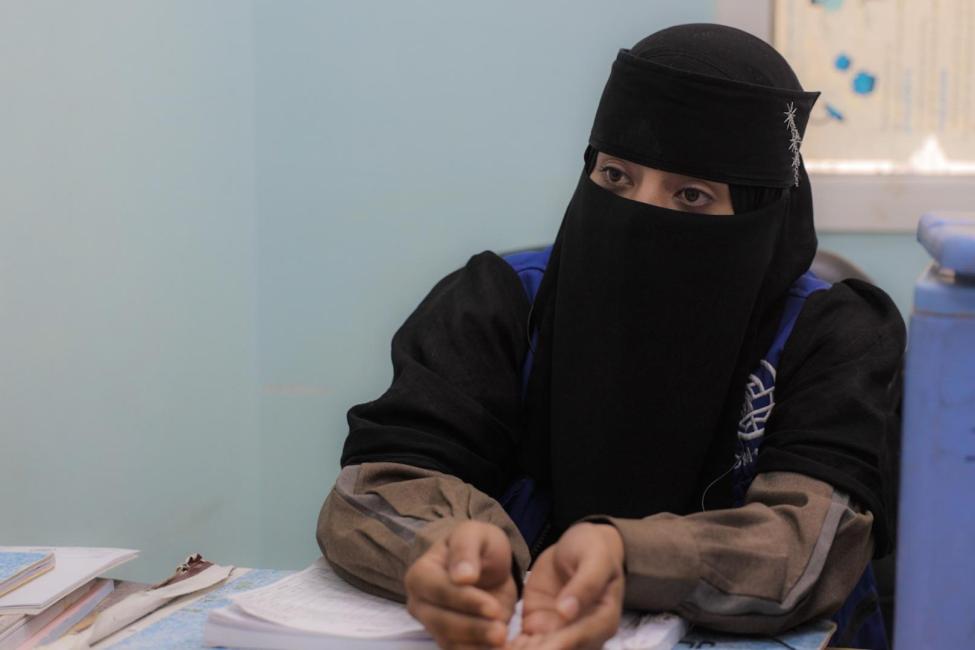-
Who We Are
WHO WE AREIOM is the leading inter-governmental organization promoting humane and orderly migration for the benefit of all, with presence in over 100 countries. IOM has had a presence in Yemen since 1994.
About
About
IOM Global
IOM Global
-
Our Work
Our WorkAs the leading inter-governmental organization promoting humane and orderly migration, IOM plays a key role to support the achievement of the 2030 Agenda through different areas of intervention that connect both humanitarian assistance and sustainable development. Throughout Yemen, IOM supports vulnerable groups including displaced people, conflict affected communities and migrants.
Cross-cutting (Global)
Cross-cutting (Global)
- Data and Resources
- Take Action
- 2030 Agenda
Ma’rib – Bushra grew up dreaming of becoming a health-care worker; someone who could alleviate people’s pain. She was born and raised in Ibb and eventually realized her dream to become a midwife that helped women in her society safely deliver their babies.
As the war escalated near her hometown, Bushra was forced to flee to Ma’rib and leave behind everything she holds dear, including her job.
Before the war broke out, many medical professionals had thriving practices in their respective cities. However, as the conflict escalated and living conditions became unbearable, many were forced to abandon their homes and seek refuge elsewhere.
After her displacement, Bushra sought out a new opportunity to work in the health field again, but this time in Mar’ib’s Maneen Al Hadad Health Centre, a facility that provides health care to hundreds of displaced people.
“When I started working in Maneen Al Hadad, the situation was dire. The health centre was not fully operational and had been neglected, even though there was a huge demand for medical services in the area,” explained Bushra.
“Displaced communities were not informed about safe health practices, especially regarding prenatal care.”
Bushra was shocked how displaced women, who often come from rural areas, knew so little about the importance of nutrition during pregnancy, parental check-ups and the complications that might accompany early marriage and delivery.
“Almost 90 per cent of pregnant women coming to us have severe anemia,” she explained.
Bushra's heart ached at the thought of expectant mothers and their unborn babies being deprived of essential care.
Raghda, Bushra’s colleague, shared her vision of helping vulnerable people achieve optimal health.
She graduated in her hometown of Taiz and started working as a health-care worker there, helping her society and providing for her family.
When the conflict intensified there, she was also forced to leave her city and found herself in Ma’rib, eventually working alongside Bushra at the health centre.
“I struggled a lot with mothers refusing to vaccinate their babies, claiming that they cause sicknesses among newborns, and that the older generations were not vaccinated and were just fine,” explained Raghda, a medical assistant who is responsible for vaccinations in Maneen Al Hadad Health Centre.
Soon Bushra and Raghda realized that their work extends beyond mere physical healing. Undeterred by the challenges that lay before them, Bushra and Raghda rolled up their sleeves and set out to restore hope.
With the support of new medical staff members, they began the arduous task of reviving the health centre and providing much-needed medical care to the displaced population.
Bushra tirelessly explained the importance of proper nutrition and health practices during and after pregnancy, while Raghda clarified to parents the importance of vaccinations.
Determined to bridge this knowledge gap, Bushra, Raghda and the other medical staff initiated a series of educational programmes for pregnant women and their families.
The team patiently answered questions, dispelled myths and provided guidance to those who needed it. This made a significant difference in improving the acceptance of vaccinations among families.
“Parents come to vaccinate their children now, this never happened before!” added Raghda.
The International Organization for Migration (IOM) later expanded the Maneen Al Hadad Health Centre – with support from the USAID’s Bureau for Humanitarian Assistance (BHA). The clinic was provided with new equipment and medicine, and health staff received incentives and training to build their capacity.
“IOM expanded the centre by building extra facilities, medical laboratory, pharmacy and childcare clinic. Now the health centre can help more people in the nearby displacement site,” explained Dr. Abdullah Salem, the General Manager of Maneen Al Hadad health centre.
Together, Bushra, Raghda and the rest of the team working in the health centre created an environment where healthcare is not just a service but a right, regardless of one's circumstances.
“Now the situation has changed for the better. We vaccinate an average of 20 children on a daily basis, compared to the past when almost no babies were getting vaccinated,” concluded Raghda.
The story of these healthcare providers is evidence of the resilience and determination of individuals who refuse to let conflict hinder their mission of healing – no matter what.


